Partnerships in the Pandemic Spotlight: North Cascades Institute
by Cristina Edwards and Emilie Lygren
Jeff Giesen is the Associate Director at North Cascades Institute (NCI), a conservation organization focused on transformative learning experiences in nature in Northwest Washington State. Although NCI is predominantly a residential outdoor learning program, during the pandemic, they have partnered with several partner organizations to offer in-person outdoor learning for elementary students in three school districts in Whatcom County (Mount Baker, Bellingham and Blaine).
North Cascades Institute has focused their efforts on providing in-person learning experiences to students who have been disproportionately impacted by closure of schools. We spoke with Jeff about how his organization leveraged existing relationships with other local environmental non-profits to provide these programs at no cost to the students who signed up.
This interview is part of our Partnerships in the Pandemic series on outdoor, in-person learning.
BEETLES: Please describe the partnership between your organization and the district, school, or classroom you’re partnering with. How did it come about? How did you build this connection with the district, school, or classroom? Who is working with students? How is it funded?
Jeff: We have a program called Connections in Whatcom county in Washington. There are about 15 organizations – from salmon stream management organizations, to nonprofits, to animals as natural therapy. These groups typically worked with kids and schools when things were normal. Once Covid hit, another group called the Whatcom Coalition for Environmental Educators (WCEE) pivoted to figure out how to work with kids during the pandemic. Most of these groups weren’t super interested in doing online learning. There’s a lot of that going on already, and we’re outdoor people in outdoor organizations. This group started approaching school districts and asked how they could safely work with their students and get kids outdoors.
We basically came up with a three-legged stool of activities in the summer of 2020. One leg of the stool was access to remote learning. A lot of the kids haven’t logged in since March. Either they had no internet access, they didn’t have family support, or they didn’t want to be on camera. District teachers knew they were going to lose a lot of kids when the school year begins. The other leg of the stool was food and meals. Teachers knew these kids probably weren’t eating when they weren’t coming to school. The third leg of the stool was outdoor enrichment.
Using these three legs, we put together a proposal with these nonprofit groups and brought it to the district. We asked them, “How about we work with your kids?” The schools wanted to bring the kids back to school sites so they could log in to distance learning at school. The schools would bus and pick the kids up, serve them breakfast, then they could log on to the computers that are already at school. Sites also provided lunch. And then in the afternoon, or in some cases all day, we take them outside and do activities.
Our local community foundation, Whatcom Community Foundation, heard about this and they wanted to be part of it. They’ve funded many of the WCEE organizations in some capacity in the past. The Whatcom Community Foundation was especially interested in our work with the schools outside of Bellingham, which is the biggest district in Whatcom County. The City of Bellingham gets a lot of opportunity, but the county just doesn’t get as much. This community foundation reached out to their funders and their community partners and raised about $200,000. It was unprecedented. They were a great advocate, and I wasn’t expecting that. We couldn’t have done it if they didn’t pull all those strings together.
BEETLES: Can you share a little about the partnership, and what it looks like on the ground?
Jeff: There are three school districts. One is in Bellingham, which is the “city” school. It’s the biggest district in Whatcom County. And then there are the two county schools, Mount Baker and Blaine, that are much smaller. These schools had different plans on how fast to return kids to the classrooms, and are a different clientele of kids. Each district is different, and each county has specific time requirements toward how much time kids spend online. The program varies a lot depending on how much each site has to be online. These three sites have the same program in name, but a completely different atmosphere and different ways of running the program depending on the school district. North Cascades Institute hired someone to run the programs and also some instructors.
BEETLES: How is it going so far? What have been some successes and challenges that have emerged?
Jeff: We’ve heard through teachers that they’ve noticed changes in the kids. We’ve heard that socialization has been great. It’s worked out really well. Kids have had a good time, and the outdoor experiences have been fantastic. The online side of things is fine. We realized we wanted to serve these kids with this opportunity, and online access was the way to get them the “hook” to the outdoors.
We’ve kept the kids in pods. We follow the school districts’ protocols, and we added some additional ones for our staff. So far, it’s been really good with no health issues. The only issues are happening with the staff. Most of the staff are younger and have roommates. We’ve had cases where a roommate got sick, and so the instructor had to quarantine. We’ve had to take a couple weeks off where instructors weren’t teaching, just to be safe. We’ve had no cases of Covid that we know of, and none of our staff have tested positive.
Kindergarteners cannot stop touching you. They want to grab your hands, they want to hug you. They would probably be licking you if they could. One time I was walking on the trail with my hands in my pockets, and a kid wanted to hold my hand. I told them we couldn’t hold hands, and they were stuffing their hands into my pockets. Then I was running from them with my hands in my pockets. They think it’s a game.
It’s this need for connection. They need the hugs. You feel so bad because you want to just scoop them up, or just hold their hand. And the sixth graders actually need it too. We start to make connections. For some of them, it’s the only adult relationship that’s not family. They did a good job with their masks, surprisingly. The social distancing is tougher. The instructors try to enforce it, but they would be enforcing it the whole time. I don’t know how to get around that.
We go to the school one day per week. It’s not like we’re there every day, so we weren’t sure exactly what we would see from these kids. On Monday after our very first week, we got an email from a teacher of the sixth graders. At that point, he was only seeing his students on Zoom. He shared, “I don’t know what’s going on with Matthew. I don’t know what happened on Friday, but that kid is engaged and interested in a way he has never been before.”
It was good to know that we got something right away. To get a comment like that made us all sigh a sigh of relief. All of that pain in the ass shit was worth it. I hear from instructors who say that the curriculum is important, but that’s not the point. The point is well being. Really we’re trying to increase this kid’s quality of life just a little bit by getting them out of the house for a day, getting them among safe people and friends and new friends.
All that said, all the problems, all the issues… I’m super proud of the program. I feel so much for the instructors who have done this and taken on this risk out there. A lot of them have said they love working with kids. They haven’t worked with kids since March, so they were willing to take a risk. We chose to take a chance at the outside in-person stuff, and it’s worked out.
BEETLES: How have you considered equity and access in setting up this partnership?
Jeff: From the beginning, we knew we wanted to work with the kids that were having trouble. We asked the schools, “Who haven’t you seen since the spring?” We trusted the schools and they sent the kids that had the most need. We wanted to reach the 10% of kids furthest from opportunity. We wanted to get kids that teachers were worried about, that aren’t eating, or aren’t getting internet access. We would not have been able to get funding if we just recruited from a flyer and enrolled whoever signed up. This was a free program to the kids who needed it, and to the funders, that was incredibly important.
Another thing that’s kind of cool in terms of access is that two of the three school districts provided para educators to be with the groups. The para educators were actually very important, because some of the kids that were coming were difficult to teach, and might run off outside. The paras were very helpful for those kids, and it was great learning for the staff.
In normal times, North Cascades Institute programs are mostly working with complete classrooms, not individual kids. We also mostly work with 5th grade students. This was different. We’re getting individual kids from individual houses that were earmarked because schools knew they needed the support. The grade levels were also really different than what we typically do, ranging all the way from Kindergarten to 8th grade.
In this part of the country, there’s a lot of outdoors. A lot of forest, a lot of trees, a lot of mountains. These kids live next to Mount Baker, which is a huge ski area with thousands of miles of trails in the National Forest and National Park. Many of them have never been there. We had to buy a lot of equipment. We know that comfort in the outdoors is going to make them want to do it again. If they’re cold and miserable, they’re going to hate it, even if it’s beautiful. We knew we had to gear up and spend a lot to provide all this clothing. We decided not to go heavy on other items. We have bug boxes, and journals, but that’s basically it.
BEETLES: What are your plans for this collaboration in the future, both in the short term and in the longer term? Would you consider continuing to form these kinds of partnerships when the pandemic “ends” or when schools return permanently to in-person instruction?
Jeff: We could do a similar model in the spring if we get funding, and we’ve talked about serving twice as many kids. There’s one school, Mount Baker, which has the highest number of free and reduced lunch students in the whole county. Because we’ve now shown we have some cachet in the district, we could provide teacher training to teach them how to take kids outdoors to do their activities outside. We can show them that it’s not a waste of time, but there’s actually learning going on out there.
It’s taken a lot of effort to do this. A lot of us are tired, and looking forward to going back to the way we did things before. It’s going to take some effort to push change. I don’t want to do that right now, but maybe in the spring. We just need a little break at the moment.
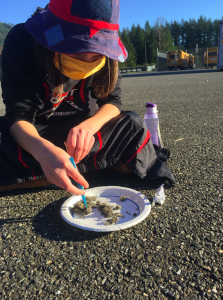 Overall, I am really happy with it though. It was hard, but if we didn’t do anything, I would have felt really bad. And I know our fundraisers and other people are interested and glad we’re able to do something. From a fundraising standpoint, we can write stories, we can share pictures. It was incredibly important that we did something with kids.
Overall, I am really happy with it though. It was hard, but if we didn’t do anything, I would have felt really bad. And I know our fundraisers and other people are interested and glad we’re able to do something. From a fundraising standpoint, we can write stories, we can share pictures. It was incredibly important that we did something with kids.
I really hope we’re not doing the same program next year, because that would mean that kids still aren’t going to school full time. But I think we can continue to do something with these kids. It would be very easy for them to just go back to the way they were. It’s going to take our organization and others to ask them to build off this and grow.
BEETLES: Do you have any recommendations or thoughts for outdoor education organizations seeking to form partnerships with K-12 schools or districts at this time?
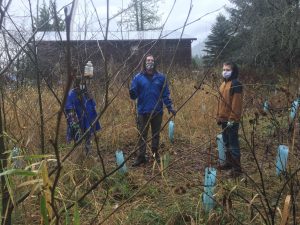 Jeff: It was also important that we found some people that were interested in it. We found a curriculum director who actually saw this as something important. We tried to work with one school district through a teacher, and unfortunately, the teacher had no power. That just died right there, because we didn’t have buy-in from somebody who had power. It really was about finding someone who has influential decision-making authority.
Jeff: It was also important that we found some people that were interested in it. We found a curriculum director who actually saw this as something important. We tried to work with one school district through a teacher, and unfortunately, the teacher had no power. That just died right there, because we didn’t have buy-in from somebody who had power. It really was about finding someone who has influential decision-making authority.
We came to the districts with a proposal, complete with a budget and a 6-page document with research and recommendations. If we had come to a school district without that, we would have been in a circular conversation for three months. Starting with a proposal was kind of a new thing for me; normally, we would all sit down at the table and hash it out. Having a proposal made a lot of sense because they needed a starting point, and they were so busy trying to start school.
Along with our partners, we had some history with the district which helped a lot. Coming in brand new would have been tough – I don’t know if we would have gotten in the door. Even with the proposal, it took a long time. We were ready to go in September, but there were district delays in finding and recruiting the kids. In some cases, the districts were going to families’ houses to recruit the kids. Even small schools are within a big system and things take time.
Working with school districts right now is like thinking outside of two boxes at once. They’re already trying to think outside the box by doing online learning. We gave them a second box at the exact same time and said: You can think outside of this one too.
By the Numbers
- Students served: 174
- Instructors employed: 19
- Incidence of Covid at the time of this interview: none
Read about how other programs are navigating outdoor, in-person learning: Partnerships in the Pandemic.

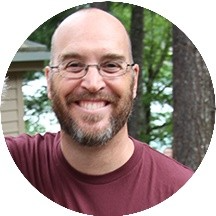
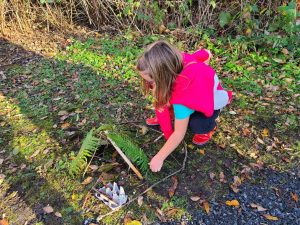
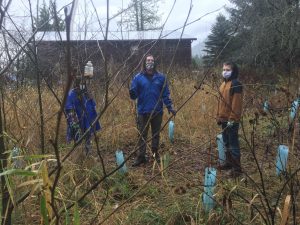
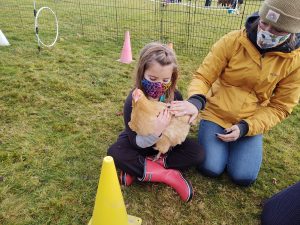
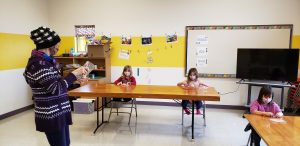
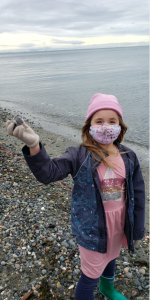
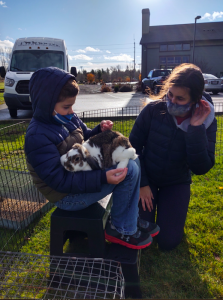
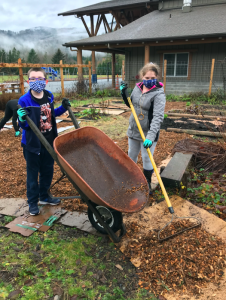
Leave a Response